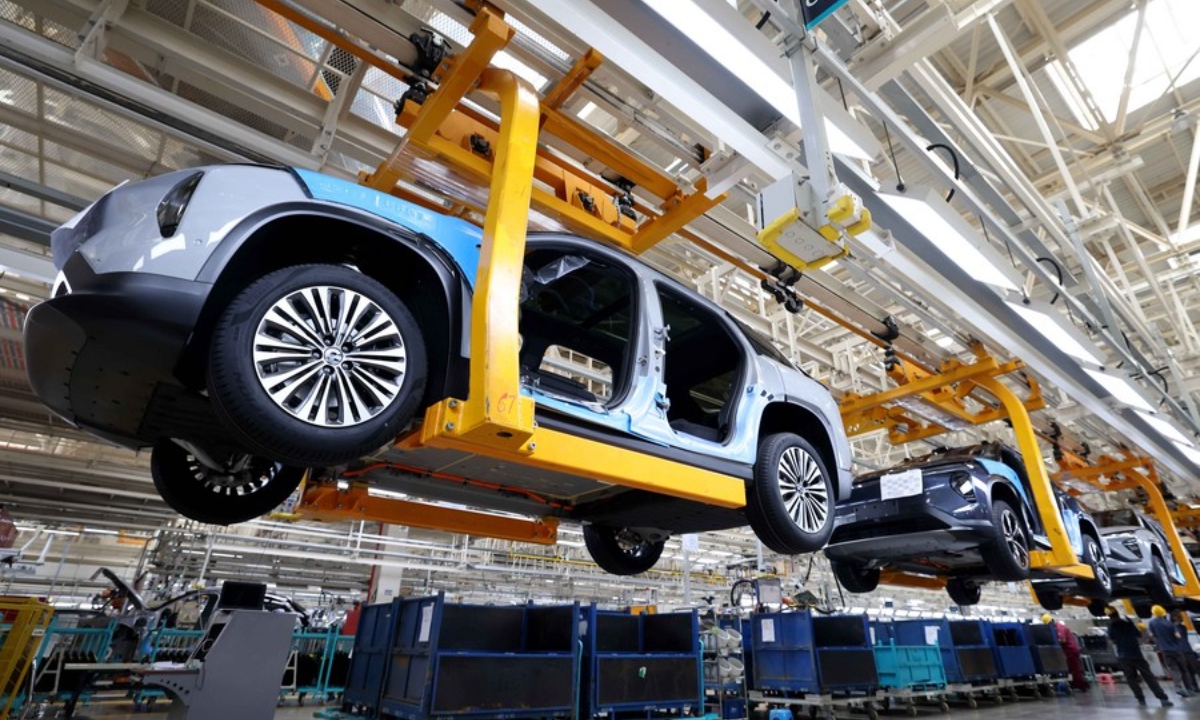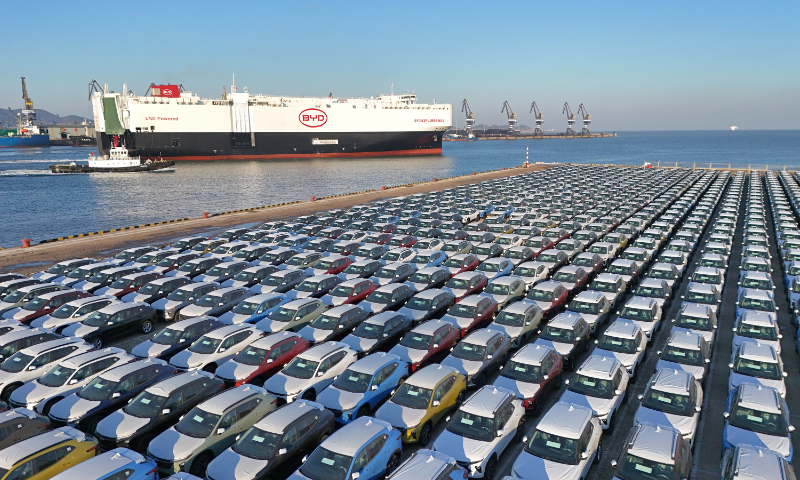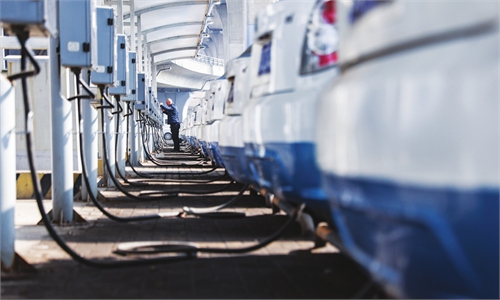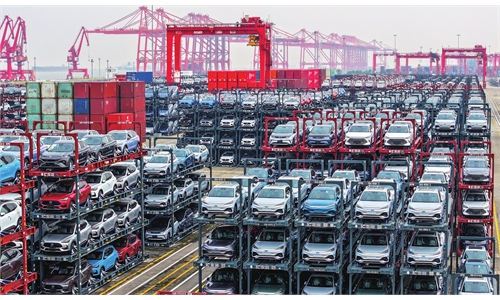
A complete vehicle production line at a new-energy vehicle factory in Hefei, East China's Anhui Province. Photo: Xinhua
China exported 5.22 million vehicles in 2023, becoming a leading car exporter in the world. Of all vehicle exports, about one-third were new-energy vehicles (NEVs), totaling 1.773 million units, up 67.1 percent year-on-year, according to statistics the General Administration of Customs released on Friday.
The export figure reflects the remarkable achievements China's auto industry has made in the transition to auto electrification and intelligence, which will also accelerate the transformation process of the global automobile sector, industry insiders said.
Such industrial transition was showcased by the latest high-tech products developed by Chinese carmakers unveiled at the 2024 Consumer Electronics Show (CES) held from January 7 to 10 in Las Vegas.
For example, an affiliate of Chinese electric vehicle (EV) maker Xpeng revealed its "flying car" concept model at the event. The electric vertical takeoff and landing car will be available for preorder from the fourth quarter of 2024, with the goal of delivering the first shipment by the fourth quarter of 2025, the company said.
The industrial transition to electrification and intelligence also enabled BYD to overtake Tesla to become the world's biggest EV maker in the fourth quarter of 2023.

BYD Explorer No.1 roll-on/roll-off ship, BYD Co's first chartered cargo ship for exports of electric vehicles, leaves a berth at Yantai Port in East China's Shandong Province, on January 9, 2024. The ship is destined for ports of Vlissingen in the Netherlands and Bremerhaven in Germany. Photo: VCG
Industrial chain upgrading
An industry insider surnamed Zhang told the Global Times that, currently, almost all China-made cars, especially NEVs, are intelligent ones as they are equipped with smart functions such as autopilot and voice control. "It is somehow embarrassing for Chinese automakers to unveil a new car without intelligent features."
China's auto output exceeded 30.16 million units in 2023, up 11.6 percent year-on-year, and sales exceeded 30.09 million units, up 12 percent, according to data the China Association of Automobile Manufacturers (CAAM) released on Thursday. Both output and sales set new records, ranking first in the world for 15 consecutive years, the CAAM said.
In particular, China produced 9.587 million NEVs in 2023, up 35.8 percent year-on-year. Sales of NEVs reached 9.495 million units, up 37.9 percent, making the NEV penetration rate at 31.6 percent, according to the CAAM.
The production of intelligent cars can drive a lot of industries, including software, hardware, chips, sensors, industrial data and more. A car is a larger application terminal than a mobile phone, and can boost the development of many high-tech industries, and vice versa, Zhang said.
A typical smart car is equipped with about 1,700 chips, a manager of a Chinese chip part supplier who works closely with the auto industry told the Global Times.
"The chip industrial chain is a long one. When it combines the automobile industrial chain, you can imagine how many upstream and downstream enterprises are connected and boosted," the manager said on condition of anonymity.
According to a recent report published by AskCI Consulting Co, a Chinese industrial consultancy, China's automotive chip market size was about 79.46 billion yuan ($11.1 billion) in 2022, and is expected to reach 90.54 billion yuan in 2024.
"China's significant uplift in the production and exports of cars means that smart parts and software will be boosted, which will help shore up the position of Chinese automobile part suppliers in the global value chain," the above-quoted Zhang said.
So far, large-scale NEV industrial hubs have been in the making in the Yangtze River Delta in East China, the Pearl River Delta in South China and the Chengdu-Chongqing Economic Circle in Southwest China.
These NEV hubs have attracted more than 1,000 domestic and foreign enterprises, forming a complete and organic collaborative industrial chain and supply chain system for NEVs - covering the whole chain of basic materials, parts, and vehicle production.
Leading globally
Industry insiders pointed out that the production and sales of intelligent cars in China, which is now at the forefront of the global market, have fueled the development of the entire industrial chain and related technologies.
Zhang cited LiDAR, dubbed as the "eyes" for cars. Chinese suppliers produce and ship hundreds of thousands of sets every month for domestic and foreign carmakers.
Nearly 600,000 LiDAR units were shipped to passenger vehicles in 2023 in China alone, according to industry media HiEV, up from about 160,000 in 2022.
"The LiDAR market was first led by US suppliers, such as Velodyne. But its marketplace was soon largely replaced by RoboSense Technology Co and Hesai Technology, two Chinese lidar manufacturers. Their success was largely boosted by the massive Chinese auto market," Zhang said, adding that Chinese lidar is now commonly used in foreign car brands too.
RoboSense unveiled the newest in its M Platform line of sensors, which are deployed for advanced driver assistance and autonomy, at this year's CES event.
"As the world's first lidar company to achieve mass production of automotive-grade solid state LiDAR, in parallel with remarkable milestones in production and delivery, CES 2024 is the perfect stage to launch the latest cutting-edge solutions in our M Platform," said Steven Qui, Robosense's CEO and founder, in a statement the company sent to the Global Times.
"Alongside our key partners, RoboSense is providing attendees an inside look into how we are making the commercialization of LiDAR a reality," Qui said.
Hesai, which also participated in the CES 2024, has recently completed the construction of a new research and development (R&D) center of nearly 70,000 square meters in Shanghai for manufacturing named Maxwell, the company told the Global Times.
"Our new Maxwell facility is not a traditional manufacturing facility but an advanced R&D center where we design and build automated lidar production lines, which can then be easily replicated across our global network of manufacturing facilities," said David Li, co-founder and CEO of Hesai.
The facility includes the world's most advanced lidar testing lab and will utilize many smart industrial robots allowing for the automation of over 100 production processes with an automation rate of 90 percent and a 45 second cycle time per lidar unit, according to Hesai.
A Chinese manufacturer of high-precision positioning products told the Global Times that the company is planning to set up new production lines in early 2024 to better supply the domestic and overseas markets, given the fast-developing automobile industry.
"We are upgrading our positioning products to meet automakers' need, especially in level 3 autonomous driving," the manufacturer said.
According to national standards, there are six levels of autonomous driving ranging from level 0 to level 5. Starting from level 3, vehicles are considered conditionally autonomous.
The year 2024 is expected to be the Year One of the explosive development of autonomous driving technology, analysts said.
Although compared to the US, China is a relative latecomer in the field of autonomous driving, China has been catching up very fast and has amassed some comparable strength- vis-à-vis the US - over the past three years, Zhang Xiang, director of the Digital Automotive International Cooperation Research Center at World Digital Economy Forum, told the Global Times.
"The next three years will be a critical period for the commercialization and large-scale application of high-level autonomous driving features in China," Zhang the director said.



